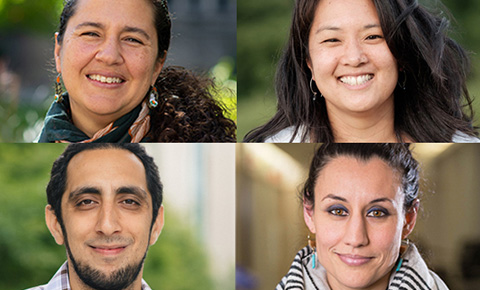National Academies Releases Report on Equity in STEM Education

Faculty members and alumni of Northwestern’s School of Education and Social Policy (SESP) co-authored a new National Academies' report on equity in science education, reflecting the School’s leadership in the field of learning sciences and STEM education.
The report explored the range of issues associated with equity in K-12 STEM education and potential steps toward more equitable experiences for students. It was completed over an 18-month period and by a committee of 16 national experts, including three SESP professors and one SESP alumna.
In a webinar releasing the findings, Megan Bang, professor of learning sciences, noted that when human learning and development is taken seriously “we see the strengths of all children and learners in classrooms and can engage [with] them robustly.”
In addition to Bang, the 16-member committee included Shirin Vossoughi and Sepehr Vakil, associate professors of learning sciences in the School of Education and Social Policy; and alumna Carrie Tzou, professor and director of the Goodlad Institute for Education Renewal at the University of Washington Bothell.
One of the committee’s main findings encouraged those with a vested interested in education at all levels (from individual classrooms to statewide positions) to create comprehensive plans for making change. The report emphasizes that these plans should be crafted with students and their families, considering their personal experiences.
“This work is not done to people, but rather with people,” said study director Kenne Dibner.
The report addressed inequities in STEM education by defining the problem, framing it, and offering reccomendations. Researchers explored all levels of STEM education, from K-12, and visited four districts around the nation to explore current STEM instruction, including Lynwood, California; Portland, Maine; Calumet, Michigan; and Prince George’s County, Maryland. In each district, the team spoke with students, educators, and families, citing several vignettes throughout the study.
By focusing on student experiences and examining greater aspects of the educational system — the current state of STEM education, the STEM subjects covered, and historical context — the researchers were able to refelect the current educational landscape in their definition of inequity in STEM.
Overall, the researchers offered 17 realistic recommendations for educators, policymakers, and authors of instructional material. The report also provides novel insights into the critical issue of education equity and allows audiences to reevaluate the way STEM is taught in their community, paving the way for change and a brighter future for all STEM students, they said during the webinar.
Northwestern’s School of Education and Social Policy was the only school in the nation to have more than one faculty member on the committee. Bang was one of several presenters during a webinar announcing the report. Others included:
- Eileen Parsons (Committee Chair), University of North Carolina
- Gudiel Crosthwaite, Lynwood (Calif.) School District
- Maisie Gholson, University of Michigan
- Stefanie Marshall, Michigan State University
The Board on Science Education (BOSE) with the National Academy of Engineering (NAE) are supporting a project that provides practical, evidence-based guidance on how to support educational equity in science, technology, engineering, and mathematics education at all levels of the PreK-12 system.
A National Academies’ consensus study requires a rigorous process that ensures this project will provide practical and thoughtful recommendations for education policy and program stakeholders.